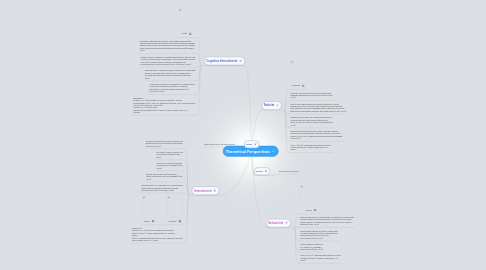Theoretical Perspectives
создатель Diane Mull


1. Nature
1.1. What we get from the environment.
2. Interactionist
2.1. A child's language learning is influenced by his/her desire to communicate with others (Morrison, 2009).
2.2. The child is plays an active role in acquiring language (Otto, 2010).
2.3. Social and cultural influences primarily form language (Otto, 2010).
2.4. Theory also focuses on the process rather than the product of language (Otto, 2010).
2.5. Interactionists Lev Vygotsky and Jerome Bruner argued that language development is both biological and social (Morrison, 2009).
2.6. Vygotsky
2.6.1. Bruner
